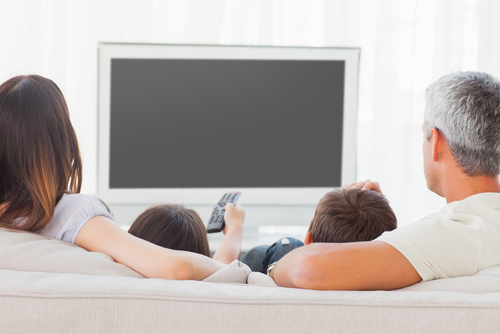Is Television Bad For You?
Also Known As: TV
Short answer
Watching TV can increase obesity, up the risk of chronic disease, slow brain development, and shorten lives. Some of this may be because of hereditary or social factors, but it’s most likely bad for you.
Harmful to your health. A few benefits may be associated, but the bad outweighs the good. Moderation is extremely important.
View Full Grading System
Category 'A'
Very healthy and numerous health benefits. Side effects are rare. Things rated an 'A+' are typically necessary for survival (for example, water).
Very healthy and numerous health benefits. A few harmful qualities may be associated, but only under certain circumstances such as an allergic reaction.
Very healthy and numerous health benefits. Harmful qualities may be associated, but aren't usually serious.
It is important to note that even the best things in life can become bad in immoderate amounts. So, although something may be rated an 'A+', overconsumption/overdoing can bring unwanted effects.
Category 'B'
Very beneficial to your health. Things rated a 'B+' may have a few harmful qualities to pay attention to.
Overall beneficial to your health. Things rated a 'B' may have some harmful qualities to pay attention to.
More beneficial to your health than not. However, harmful qualities are most likely associated and shouldn't be overlooked.
The main difference between category 'A' and category 'B' is the harmful qualities typically present in 'B' items. Serious side effects are usually uncommon, but are still possible and should be taken note of.
Category 'C'
Both beneficial and harmful qualities associated. Things rated a 'C+' are typically a bit more on the beneficial side. Still, moderation is important.
A fairly even ratio of beneficial and harmful qualities. Moderation is important. Very general topics that can lean towards both sides of the spectrum will be placed here as well. Rice, for example, can be good or bad depending on the type.
More harmful than beneficial. Side effects are common, especially when consumed/done excessively. Moderation is very important.
Category 'C' usually denotes to both good and bad qualities. When it comes to this category, it is important to keep this word in mind: moderation.
Category 'D'
Harmful to your health. Although benefits may be associated, the bad most likely outweighs the good. Moderation is very important.
Harmful to your health. A few benefits may be associated, but the bad outweighs the good. Moderation is extremely important.
Harmful to your health. Very few, if any, benefits are present. Things in this category should be avoided as much as possible.
Category 'D' is typically for things that are more harmful than beneficial. While consuming/doing something unhealthy once in a blue moon shouldn't hurt, we definitely recommend eliminating 'D' items as a regular part of your routine/diet.
Category 'F'
Category 'F' is for things that fail to bring anything beneficial to the table, and are very harmful to your health. We recommend completely avoiding anything in this category. Long-term side effects of 'F' items are usually very serious.
Category 'N'
'N' stands for neutral. Things placed into this category are generally (a) neither good nor bad for you, or (b) lack the necessary evidence to reach any conclusions.
Long answer
Watching TV is sedentary. Generally, you're sitting down when you do it. You're spending time sitting still instead of doing other things. Being sedentary for long periods of time increases your risk of becoming obese.
Moreover, we move even less when seated in front of the TV than we do with other sedentary activities. You're at risk of more than putting on weight. Research published in the journal Diabetologia estimated that every hour spent watching TV per day increases your risk of developing diabetes 3.4 percent.
Why else might this be? Aside from being a particularly sedentary activity, watching TV might also affect your food choices. You're more likely to eat junk food when you're sitting in front of the TV, which can increase your risk not just for diabetes or obesity but heart disease and other chronic conditions linked to junk food's higher ratio of processed ingredients.
Watching television is also socially isolating: when you're watching, you're spending less time talking to and engaging emotionally with other people. Having an active social life is important for your health and is linked to a number of long-term benefits. You're depriving yourself of those benefits when you're spending time in front of the box.
These effects are particularly pronounced in children. Children younger than 5 who spend time in front of the box develop language skills more slowly and have reduced attention spans. Children younger than ten are at a pronounced risk of developing heart disease or obesity later in life. Scientific American has written about studies that link depression and risk of committing a crime to childhood television exposure.
There's some evidence that these worrying trends might be linked not just to watching television but to hereditary or economic factors. If you have kids, however, err on the safe side: you should take care not to use the television as a babysitter - the younger they are, the less time they should spend watching.
Finally, watching television is linked to an early death, according to the American Heart Association. We live in the so-called "golden age" of television, and there's plenty to recommend the quality programming that's lauded and analyzed by our critics. Limit your exposure, however - too much of a good thing can lead to a whole range of problems.
Possible short-term side effects
Possible long-term side effects
- increased risk of diabetes
-
increased risk of obesity
-
can interfere with childhood development
-
socially isolating
-
may lead to an early death
Benefits
Please turn your Ad Blocker off to see this content. Thank you!


 Approved by
Approved by 














